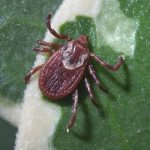This year is a pretty tough one for getting a tick on you or your pet. But, let’s have some fun! Who’s up for the Challenge? The Pennsylvania Lyme Resource Network has created a Tick Check Challenge to help educate and protect kids (and adults) from Lyme Disease and other debilitating tick-borne diseases.
Here’s how it works:
- Watch the video (click on link below)
- Download the song clip
- Dance
- Post & Tag
- Fun!!
Follow this link to learn more and start practicing your dance moves. TICK CHECK CHALLENGE! – PA Lyme Resource Network
Ticks have a variety of natural predators including opossums, ants, spiders, and birds, though most are generalists that only occasionally feed on ticks. As such, these generalist predators tend to be ineffective at significantly reducing tick populations. Guinea fowl and chickens are commonly promoted as tick controls, though research indicates that their tick consumption is minimal and is not effective in reducing local tick populations. Additionally, as guinea fowl wander around a property they can become hosts to ticks themselves, further reducing their value as a biological control. An increase in wild turkey populations has led to questions regarding their impact on tick numbers. Though turkeys will consume ticks on occasion, turkey foraging has not been found to reduce tick abundance and they too can become hosts to a number of tick species.
Penn State Extension has a great site for you to visit with photos and good info: Common Ticks and Tick-borne Diseases in Pennsylvania (psu.edu)
NATURE NUGGET: One single opossum can kill and eat some 5,000 ticks in a single season. The actual spread of Lyme disease, or the rate at which it gets spread, can be diminished thanks to the hard work and voracious appetites of opossums!
NATURE QUOTE:


“Porcupine Pat” McKinney is environmental education coordinator for the Schuylkill Conservation District and provides programming for people of all ages with an emphasis on schools, public programming and nature center development. “Porcupine Pat” hails from Marion, Ohio and has a BS with Distinction in Natural Resources – Environmental Interpretation from Ohio State. He is a recipient of the prestigious Sandy Cochran Award for Excellence in Natural Resources Education from the PA Forestry Association, the Schuylkill Pride Award, and the PAEE “Outstanding Environmental Educator Award.”




